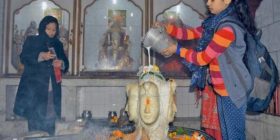There have been many books depicting the Kashmir issue from a man’s perspective but hardly any from the women’s point of view.
Kashmir is on the boil; the “Azadi” chant reverberates from every corner; normal life is at a halt. A young, educated, career-oriented woman’s life gets entangled amidst all this. The result is Nayeema Mahjoor’s debut book “Lost in Terror” (Penguin, Rs 299, pp 305).
There have been many books depicting the Kashmir issue from a man’s perspective but hardly any from the women’s point of view — on their suffering and misery. And this is why Mahjoor, Chairperson of the Jammu and Kashmir State Commission for Women, decided to write the book.
“Usually it’s always a man’s perspective which has been penned down when it comes to the Kashmir issue. I was witness to the situation prevailing in the early nineties, like other women who were at the forefront of every misery. I took the challenge to tell story of women who were voiceless and helpless. To highlight their misery at home and outside was my sole objective,” Mahjoor, 55, told IANS in an email interview from Srinagar.
Her rather bold book opens up her personal life, her bonding with her father and sisters, her disrupted marital terms with her husband, and her lost friends.
“Ours is a traditional society and issues relating to women are always brushed aside. Nobody dares to delve into their lives. Somebody has to take a stand, so let it be me,” she asserted.
She narrates how often she got entangled in the difference in political ideologies between her father and her husband.
“After my marriage, Baba and my husband continued the political discourse which sometimes took a nasty turn,” she writes.
When asked whether coming out so candidly would affect her personal life, she said that creating a character wouldn’t have had the same impact on readers as reading a first-person account.
“To safeguard other women’s dignity and respect, I had to depict personal relations so that society becomes aware about issues which are preferred not be spoken about. My relations are not so weak, so I am not worried about disclosing my terms with my family,” the author said.
She also writes about how the marital relationship with her husband would often turn nasty and translate into domestic violence.
“His eyes were bloodshot, and he started abusing me physically and mentally. I was gasping for air; my breathlessness nearly killed me,” she pens.
She strongly affirms that it is still very tough and gruelling to speak about the distressed circumstances of Kashmiri women.
“There are so many issues, mostly domestic, that women are forced to keep folded or buried somewhere within. Women need to speak up about issues that are violent, volatile and disturbing,” stated the author.
Though women’s voices are often unheard, Mahjoor is optimistic that change will come in society and writing about issues pertaining to women may help a lot to improve their situation.
“Only more writing by women and for women can change the situation. We are brought up in an environment to only listen and cannot say anything; only give and never demand anything. Women have to learn to say that if they are not heard then they should shout to make themselves heard,” said the author.
Talking about the acceptance of her book, she said: “I have faith in my readers, they may be sceptical about political issues but I believe we all are compassionate and will come forward to heal the wounds of thousands of women.”






Leave a reply